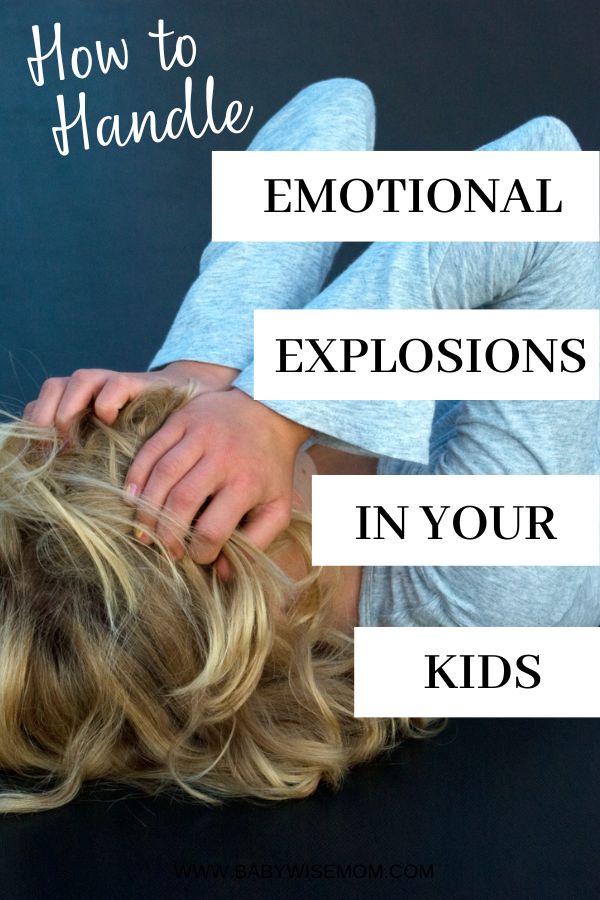How to help an emotionally intense child prevent and manage emotional outbursts. Understand what steps you can take to avoid the outburst and how to best handle the outbursts when they happen.

An emotionally intense child can be difficult to calm down when they get upset. The word “intense” is used for good reason.
Emotionally intense children move from one emotion to another quite quickly. Parents are left wondering exactly what to do and how to manage these explosions.
It is widely accepted that the most effective parenting style is the authoritative parenting method. However, tried and true strategies often do not work with emotionally intense children.
This can be difficult because you have to learn to parent your emotionally intense child differently than you do your other children.
Post Contents
What Is An Explosion
An explosion does not have to be loud or aggressive for it to be an explosion (although it can be). Sometimes these are even quiet and passive. Your child might become sad or anxious.
An explosion can come if your child has become overwhelmed, stressed, and frustrated.
Most children have outbursts for the following reasons (found in chapter 13 of Emotional Intensity in Gifted Students):
- To communicate a need
- To get something
- To escape something
- To protest
Gifted children tend to be emotionally intense more often than other children. Read 15 Common Characteristics of Gifted Children if you suspect your child might be gifted.
Avoiding Explosions
I am always an advocate for avoiding unwanted behavior rather than just dealing with unwanted behavior. Learning to avoid the explosion is preferable to just managing them once they happen.
Think prevention first.
Have Clear Expectations and Consequences for Behavior
Children need to know what the expectations are. When are they allowed to play with friends? When does homework need to happen? What are their chores and when should they happen? What behavior is allowed and what is not?
You need to teach your child what is okay and what is not. You cannot expect a child to just know.
Children will also do well when there are clear consequences for behavior. Logical consequences often work well.
>>>Read: How to Quickly Think of a Logical Consequence for Kids
You can approach consequences where your child earns privileges based on following through with expectations or your child loses privileges based on breaking expectations. You might have a mixture of both.
>>>Read: Benefits of Teaching Kids to Deal With Consequences
As parents, we need to put effort into responding to conflict in a calm way. We can be firm, but we should not be emotionally intense as we try to avoid emotional intensity from our kids.
If you struggle with remaining calm, take note of what pushes you over the edge and step away before it gets that far.
Set Up Boundaries
Children need boundaries. They need to know their boundaries. This gets more difficult as you have multiple children. It is is easy to give the oldest child too many boundaries and the youngest child not enough boundaries.
>>>Read: How to Set Boundaries for Children & Siblings
Children need freedoms and boundaries that are age-specific. When a child is outside of her boundary, she will become wise in her own eyes, leading to more disobedience and emotional outbursts.
>>>Read: How to Keep Siblings in the Funnel
This quote also gives good perspective on the importance of boundaries:
Clear boundaries allow children to remain children within the family structure. This is especially important with gifted children as they tend to naturally take on adult roles very early.
Emotional Intensity in Gifted Students, page 62
Give the Child Responsibilities
Children need chores. They need to contribute to the home. When the child has chores and responsibilities at home, he feels connected and part of the home. They know they are an important part of the family.
Having chores also helps children to have more respect for the things in the home and the people who live there.
>>>Read: A Beginner’s Guide to Teaching Kids To Do Chores
You can also have a family council each week. Each week we gather as a family and go over our plan for the week, concerns anyone has, goals people are setting, etc. We also discuss things like the weekly meal plan, family vacations, and more.
Keep children in the loop, as age-appropriate, in the state of the home and the family.
Establish Communication
A child that is throwing a lot of fits, at any age, often lacks the communication skills to communicate in a healthier way.
Help your child recognize and name emotions. Help your child recognize what are the triggers for getting emotional. Does your teen get highly emotional when hungry? Help her recognize that and work to avoid getting to that point.
It is important to discuss these things when it is calm. Do not bring it up in the heat of the moment. Teach your child to recognize and name emotions while she is happy.
Have your child be aware of what physical and internal signs come before an explosion. Do tears come? Does the heart rate increase? Does the body get warmer?
You will then want to help your child find ways to calm down and avoid an outburst. Deep breathing and visualization can help.
A really helpful book for this is The Kids’ Guide to Staying Awesome and in Control.

It is important that as parents you do not ignore the intensity or simply try to stifle the emotional intensity. It will not work in the long-run.
The sooner they develop an understanding for their own behavior, an acceptance of the intensity as a natural part of their personae, and the tools needed to monitor and adjust their reactions to things, the sooner they are able to live happily with their intensity.
Emotional Intensity in Gifted Students, page 85
If you give your child the tools, she can learn to live well with the intensity.
Managing Explosions
Despite your best efforts and work, explosions still will happen, especially while your child is learning to manage himself.
As parents, we need to manage our own reaction to an explosion. Emotion begets emotion. If you become emotional because your child is emotional, you will not help the situation.
Disengage.
Let yourself calm down. Let your child calm down.
Once everyone is calm, you can return to tactics used to prevent. You should also reflect on the moment and figure out why your child had an emotional outburst.
What can be done better next time? Did you contribute? Was the routine off? Did you expect behavior that was not outlined?
Listen to what your child experienced. Do not tell her she is wrong in what she saw or felt. Observe what you saw. Be honest. It is okay if you disagree.
What could be done next time? Let your child think about this and come up with her own solutions before you jump in.
What are the consequences for the behavior (if applicable)? Typically the consequences are not so much about the outburst as there are consequences that need to be applied for things before the outburst happened.
For example, your child might have been dishonest about completing a chore. Once he was caught, he had an emotional outburst. There should be consequences for the dishonesty. Do not let the outburst prevent a consequence, or you will be giving positive reinforcement for outbursts.
Conclusion
As you help your emotionally intense child manage explosions, you will need to offer a great deal of patience and grace as a parent. You will likely need to do some personal development, also, as you learn to manage your own emotions during these explosions.
Remember that progress in this area will take time, but with consistency and effort from you and your child, you will be able to make great progress!
Related Posts
- How To Respond to Your Emotional Preschooler
- Emotional Intensity in Gifted Students Book Review
- How to Allow Children to Feel Without Acting Out
- How To Help Your Child Work Through Emotions
- Helping Pre-Toddlers with Intense Emotions

